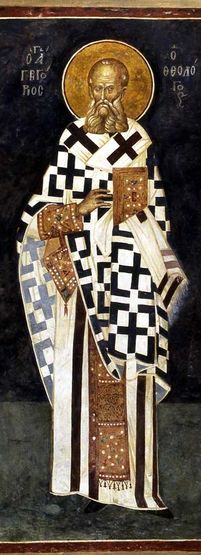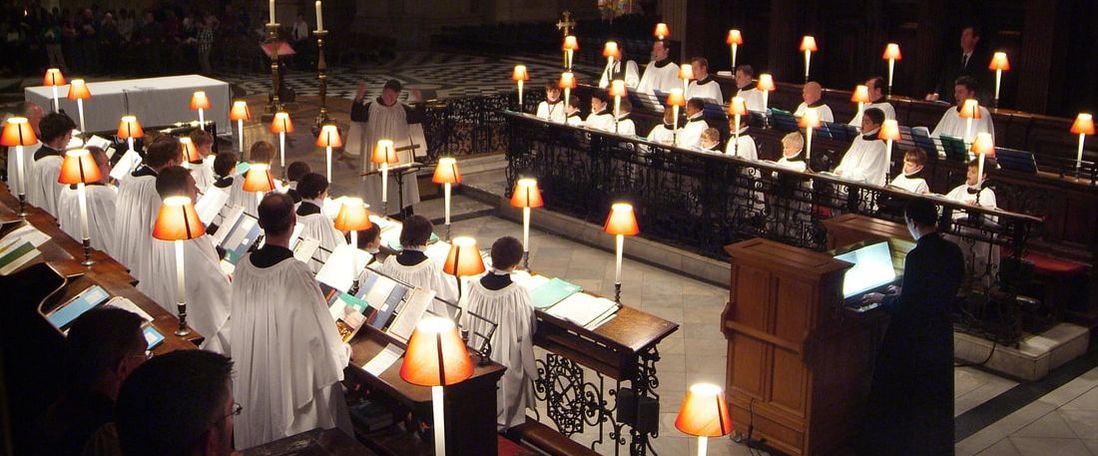Series OverviewOn Wednesday nights throughout the next nine months, we will be walking our way through the Bible, from Genesis to Revelation, learning the story of salvation, especially how everything points to and is fulfilled by Jesus. Lesson 18: Advent of the Kingdom |
|||||||||||||||||||
| god_becomes_man_l18-19_advent_of_the_kingdom_and_the_second_adam.mp3 | |
| File Size: | 95970 kb |
| File Type: | mp3 |
Series Overview
Lesson 17: God's Anointed Man, Redux
Lesson Overview
Key Text(s): Isaiah 42, 49, 50:4-9, 52-53
Office Texts: Psalms 40; Isaiah 42, Acts 8:26-40
Media
Click below to download the audio recording.
| god_becomes_man_l17_gods_anointed_man_redux.mp3 | |
| File Size: | 95457 kb |
| File Type: | mp3 |
There was one crucial exception to this trend however. Attendance across the nation was actually up at one particular kind of service. It was the many Choral Evensongs sung every evening throughout the cathedrals, collegiate churches, and in some large parishes of the nation. Even non-Christian commentators have applauded this trend. Australian atheist Dick Gross has publicly argued for the enduring value of Choral Evensong, and why it should be supported even by the "godless."
If you are curious about all the hub-bub, wonder no more. This coming Sunday, Holy Trinity Parish, right here in humble Hillsdale, Michigan, will take a crack at this venerable service. And our excellent choir will do a beautiful job of it too, if you may permit a pastor to boast a bit about his congregation.
But what is it? In short, it's the traditional service of Evening Prayer sung. A few things worth noting here.
- The service of Evening Prayer is a direct descendant of the ancient daily evening services of the earliest Christian churches, mediated to us by the monasteries of the medieval centuries. Its evening New Testament hymns, the Magnificat and the Nunc Dimittis have been recited by Christians in the evening since ancient times.
- The service as we now have it is the product of sixteenth century Archbishop of Canterbury Thomas Cranmer, the architect of the venerable Book of Common Prayer as a whole, and England's first Protestant Archbishop. It was an intentional adaptation of the medieval monastic prayers designed to make the service both more publicly accessible, and a more friendly platform for the regular public reading of Scripture, both foundational issues for the Protestant Reformers across Western Europe and not just in England.
- The tradition of singing the service also goes back many centuries before the Protestant Reformation, and it continued for many centuries afterwards (to the present day, in fact!). Cranmer's alterations to the medieval service made for a unique vessel for choral composers; with the evening Canticles (the Magnificat and the Nunc Dimittis) together in one service, choral arrangements of each could be composed together as a set.
- As a consequence of this, Evensong has been the locus of a vast chunk of sacred choral music composed in the English language since the sixteenth century. The repertoire for Evensong is nearly endless, which is why the service can still be performed daily (by professional choirs, of course; the music is not easy!) throughout England without getting old. The words remain constant (other than the Scripture readings themselves, which change daily), but the music is always changing.
It is truly a remarkable service, one beloved the world over, without any exaggeration. Only choirs of a slightly higher caliber can hope to pull a full blown Choral Evensong off, and Holy Trinity's choir will make the attempt. In fact, this is their second attempt in less than six months, and past precedent shows they will not be unsuccessful.
So consider carving out an hour of your time on Sunday evening and joining us for this breathtaking service of worship to God's divine majesty.
But remember, with the choir doing a lot of singing, it may feel more like a concert, but it is for the public worship and glorification of God that this service is designed. So come ready not just to hear a good performance, but to pray inwardly what the choir sings outwardly, and above all things to give glory to Almighty God.
A Reluctant Saint
Life Lessons from St. Gregory of Nazianzus
talk given to The Catholic Society of Hillsdale College
Conviviuum, Thursday, February 15, 2018
---
| 2018-2_conviviuum_a_relunctant_saint.mp3 | |
| File Size: | 57310 kb |
| File Type: | mp3 |

Gregory is known primarily for his theology. He is preeminently the theologian of the Trinity, a truth long recognized by the church, which very shortly after his death boldly acclaimed him Gregory the Theologian for his crucial and groundbreaking insights about this very doctrine. For Gregory, the doctrine is the absolute centerpiece of Christian revelation and the fundamental bedrock of salvation, so much so that he can say:
I consider the Trinity the only true devotion and saving doctrine. (Oration 43.30, Funeral Oration on the Great Saint Basil)
But I must confess, it is not primarily Gregory’s doctrine that draws me to him. Gregory was an extremely dynamic personality. In the course of his life, he studied and mastered the highly esteemed art of oratory and became a sort of fourth century Billy Graham, helped form the monastic foundation of his friend Basil for whom the latter is widely acclaimed even today, healed schisms in his father’s church and elsewhere by his preaching, wrote the first dedicated reflection on the art and dignity of pastoral care, was pulled from retirement on several occasions by adoring fans, single-handedly revived faith in the Nicene Creed in the Roman capital Constantinople by his preaching alone, was acclaimed Archbishop of that city by a crowd after a ray of sunlight landed on him in a dimly lit church, gained the favor of an Emperor and presided over an Ecumenical Council, and still had time to record several thousand lines of finely tuned poetry about his life and his theological contemplation. All the while, he survived storms at sea, stonings in church, assassination attempts, political machinations, the attempts of his own friends to use him to their advantage, and, horror of horrors, overbearing parents.
What is striking about how God managed to providentially use Gregory in all these things is the way in which Gregory himself endured it all kicking and screaming. Gregory was an introverted and very sensitive soul, and his rote reaction to crisis was, somewhat humorously, to run. He ran away when his father forcibly ordained him to the priesthood. He ran away when his friend Basil forcibly ordained him to the episcopate. He ran away when his father’s church tried to make him his father’s successor as bishop after the latter’s death. He ran away when the political tides turned against him at the Council of Constantinople in 381. Gregory loved to run. And better yet, Gregory loved to complain about it. Considering his flare for the dramatic, Gregory was without a doubt a reluctantsaint. By the end of his life, Gregory was left a frustrated and wounded man who felt that he had failed in all the trials he’d been forced to face and, most tragically of all, had been failed by his family and friends, who were often the ones who forced him into these trials in the first place. Gregory died believing that his life’s work—work he wouldn’t have done had he not been cajoled by others—was for naught.
But my how God used Gregory mightily! His doctrinal synthesis became thestandard for the eastern church almost immediately after his death, and in translation he heavily influenced Jerome and Augustine and the whole of the western church as well. His sermons set the rhetorical bar for all Christian preaching for centuries, where they were preached every year on important feast days in Constantinople well into the second millennium. His thoughts on pastoral care heavily influenced such giants as John Chrysostom and Pope Gregory the Great. When subsequent generations were tasked to, as John of Damascus put it, “think theologically,” they invariably meant by this “to think like Gregory the Theologian.” Even Protestant favorite John Calvin found “great delight” in Gregory’s vision of the Triune God. To have him on your side is to have a very influential friend indeed.
Gregory for his part saw none of this. But that great Triune God in which he delighted saw it all. His hand was truly heavy on his servant Gregory, and he used him mightily. Indeed, that selfsame Holy Spirit Gregory so loved to contemplate and defend continues to return the favor to this day. Gregory is still our man on so many points. But perhaps on no other does he better teach us than this: God providentially preserves those who love him, and even amidst, as Gregory says, “calamities of soul,” God makes their names great. It is, in the last analysis, Gregory’s vision and example of divine providence that makes him a dear companion in the faith for me, and for which I remember him most fondly:
It is necessary to accept every turn of the rudder by which God leads me out from both struggle and storm, till he has harbored me in a fair haven: if indeed he did not build the vessel to no purpose, but toward a good and well-intentioned end. (Poem 1.1.6, The Second on Providence, 112-116)
Fr. Adam Rick
A prayerbook Christian with a patristic twist.
Archives
September 2021
July 2021
April 2021
February 2021
November 2020
August 2020
May 2020
March 2020
October 2019
June 2019
May 2019
April 2019
March 2019
February 2019
January 2019
December 2018
November 2018
October 2018
September 2018
June 2018
May 2018
April 2018
March 2018
February 2018
January 2018
December 2017
November 2017
October 2017
September 2017
April 2017
March 2017
February 2017
Categories
All
Anglicanism
Biblical Bios
Creeds
Daily Office
GAFCON
God Becomes Man
Hillsdale College
Holy Communion Liturgy
In Memoriam

 RSS Feed
RSS Feed
